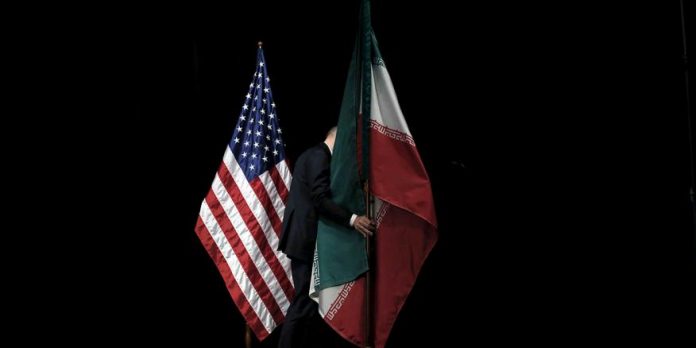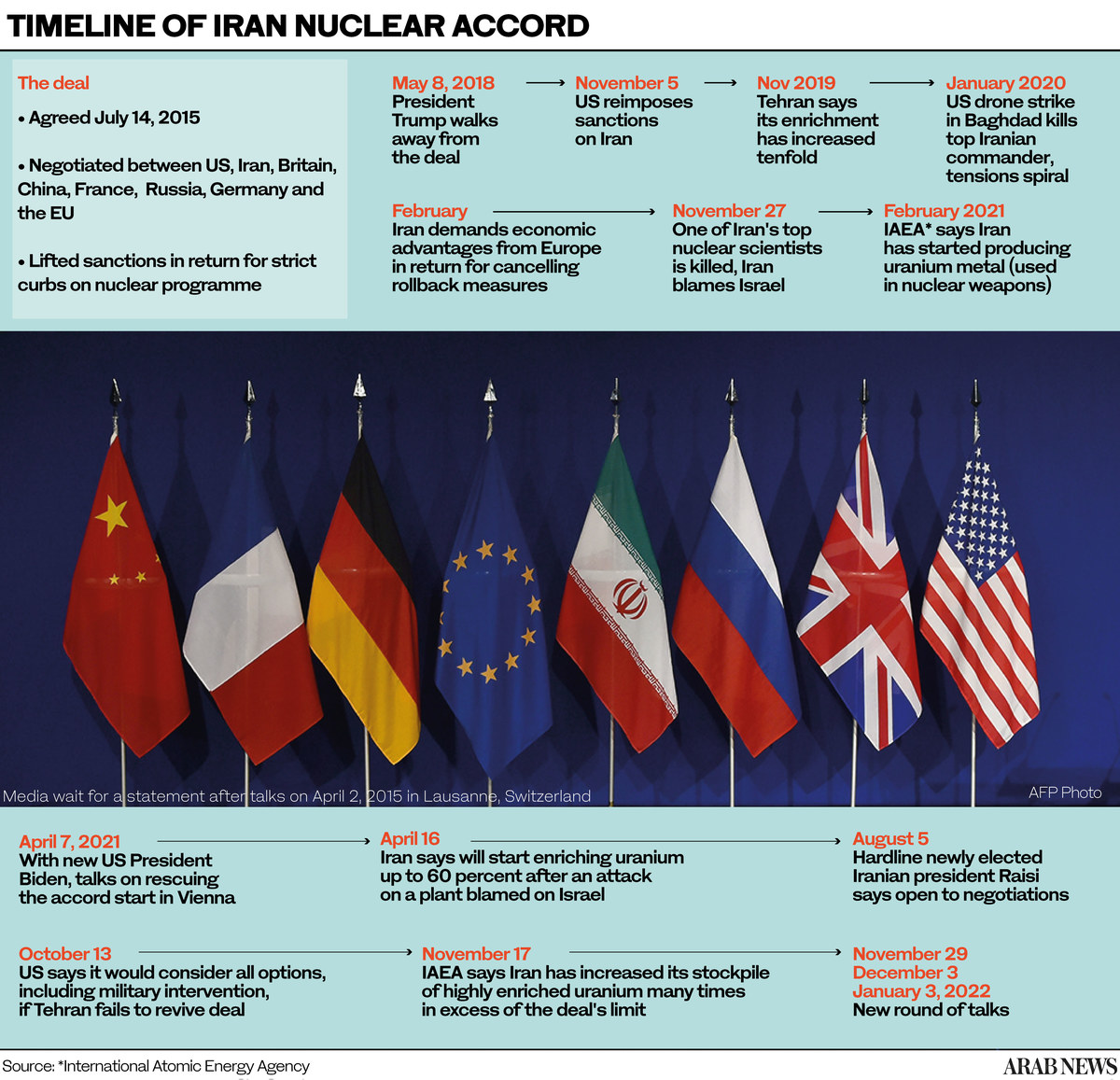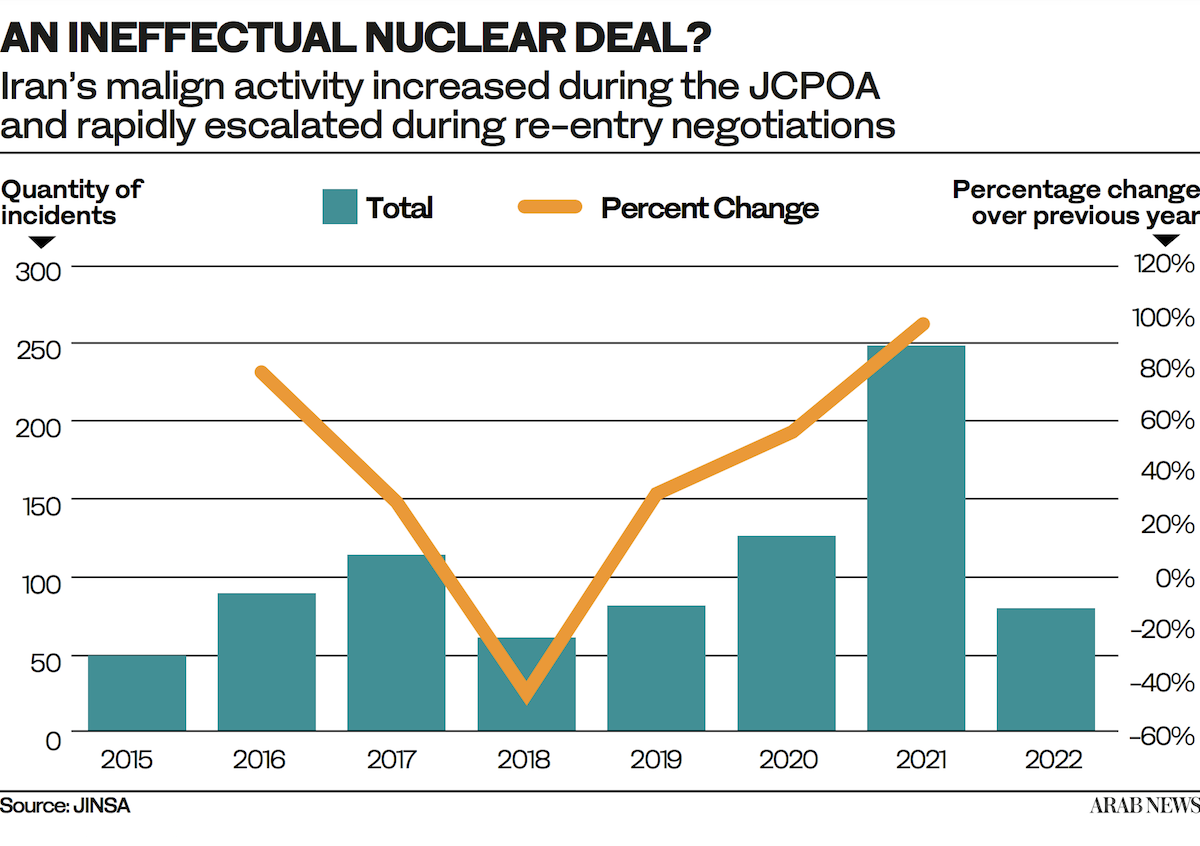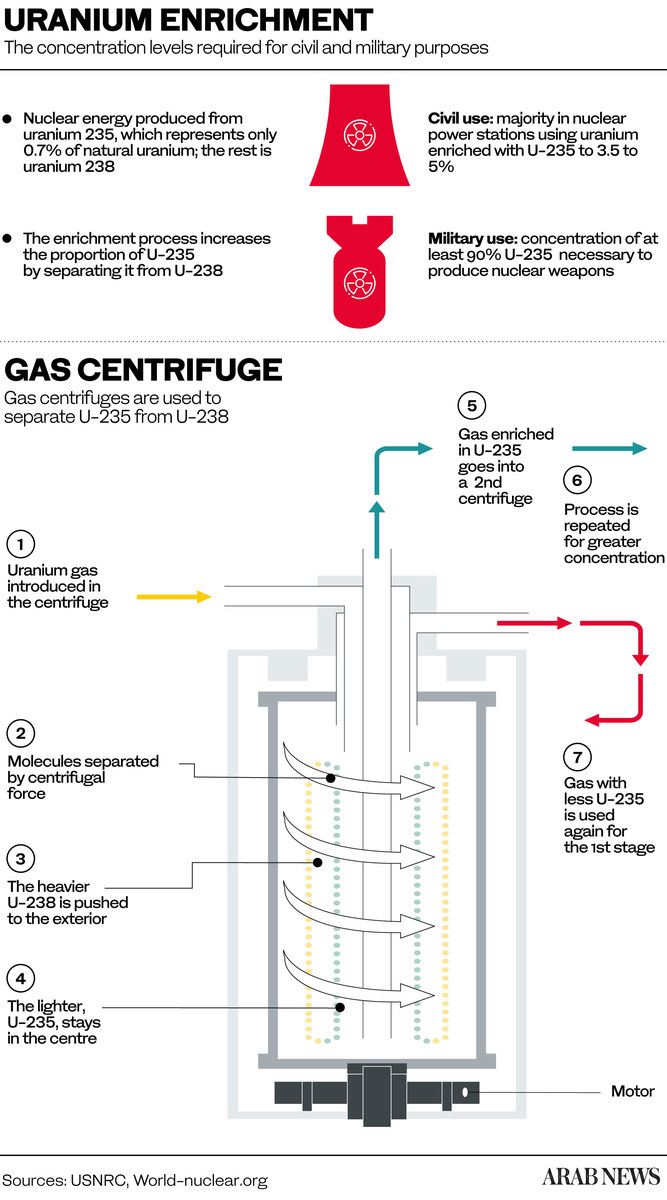White House officials believe Iran is inching closer to becoming a nuclear threshold power and could be just weeks away from producing both sufficient fissile material and the necessary technology to weaponize and deliver a nuclear payload.
Reaching the milestone of a significantly shorter breakout period to building a nuclear bomb would give Iran a great deal of leverage and bargaining power in future negotiations even as it seeks hegemony over the Middle East in accordance with its grand strategy.
Despite a concerted effort by the Biden administration to coax Iran to comply with the 2015 nuclear deal, indirect negotiations between the two sides have hit a roadblock owing to Tehran’s insistence that the Islamic Revolutionary Guard Corps be removed from the US list of designated foreign terrorist organizations.
Jason Brodsky, policy director at United Against Nuclear Iran, an advocacy group based in Washington, believes Iran has been free to push ahead with its nuclear program because Western powers have lacked the commitment to set firm conditions.
“On advanced centrifuge research and production, Iran has made significant progress over the last year — particularly after it started enriching uranium to 60 percent, and in its production of uranium metal,” Brodsky told Arab News.
“This all happened because the Iranians tested the international community’s red lines and found out that what once were thought to be red lines were not really red lines.”
If recent Middle East history is any evidence, the tacit concessions made by the Obama-era nuclear deal with Iran, formally known as the Joint Comprehensive Plan of Action, did not slake the thirst of the regime in Tehran for nuclear arms or regional dominance.
US President Joe Biden hopes to reverse his predecessor’s decision in 2018 to withdraw the US from the 2015 nuclear accord. The Trump administration believed the deal did little to prevent Tehran from obtaining a nuclear weapon, stem its ballistic missile program, or halt its malign activities across the Middle East.
According to Brodsky, even after the sobering experience of crippling sanctions slapped on the Iranian economy by the Trump administration following the withdrawal from the JCPOA, the regime in Tehran still harbors nuclear ambitions.
“Iran will continue along this path,” he said. “Iran is increasing its capabilities in the production of centrifuges, with production lines and capacities being expanded, according to recent remarks from the International Atomic Energy Agency director-general. This can be seen at Natanz as well as a separate, new location in Esfahan.”
Negotiations in Vienna between Iran, the US (participating indirectly) and the other original JCPOA co-signatories — China, France, Germany, Russia and the UK, along with the EU — have stalled. In Brodsky’s view, Tehran is deliberately playing for time in the hope of strengthening its bargaining position.
“The Iranians for over a year have been dragging out the negotiations to advance their nuclear program so that it produces a shorter and weaker deal for the West while notching a stronger agreement for itself in the form of non-nuclear sanctions relief,” he said.
While the international community is preoccupied with the conflict in Ukraine and the threat of an armed confrontation between Russia and NATO, a moment of reckoning looms when Washington will have to decide whether the talks with Iran have reached a dead end.
Andrea Stricker, a research fellow at the Foundation for Defense of Democracies, believes Iran is rapidly approaching a nuclear milestone that cannot be dealt with at a later date through a watered-down deal.
“It is concerning that Tehran is close to amassing enriched uranium sufficient for a nuclear weapon but Washington’s intention appears to be to scare recipients of this message into supporting a revived Iran deal,” she told Arab News.
“Iran has nearly enough 60-percent-enriched uranium for one atomic bomb, which does not require further enrichment to weapons-grade. And, overall, it has enough enriched uranium for at least four weapons.”
She said the solution to the problem is not an accord “that provides billions of dollars in sanctions relief for Tehran and allows it to expand its uranium enrichment program starting in 2024.”
According to Stricker, the deal offered by Biden could mean no restrictions on Iranian advanced centrifuge development from 2024 onward, thereby permitting a significantly shorter breakout time to a bomb than under the original JCPOA.
“Under the terms of the reported deal, Iran’s breakout time would only extend to around four months, not at least seven months, as in 2015,” she said.
“Iran is permitted to add 400 centrifuges per year to its stockpile of advanced centrifuges starting in 2024. By the end of the accord, Iran would be on the threshold of nuclear weapons and unstoppable if it chose to break out.”
Wary of a preemptive assault by its enemies, Iran appears to be placing its most advanced centrifuges deeper underground, beyond the reach of international monitors, saboteurs and missile strikes.
This strategy is reinforcing latent suspicions that Iran’s centrifuge production, enrichment research and production efforts are serving military ends rather than strictly civilian purposes, as the regime claims.
“Iran is restarting advanced centrifuge production at two underground facilities that Tehran relocated to make the sites impervious to sabotage or military strikes,” said Stricker.
“Theoretically, Iran could use around 650 IR-6 centrifuges, for example, and existing stocks of enriched uranium to make weapons-grade uranium very quickly. These two centrifuge-manufacturing facilities are not currently under IAEA monitoring, so the world has no assurance that Iran is not diverting centrifuges for a clandestine enrichment plant.”
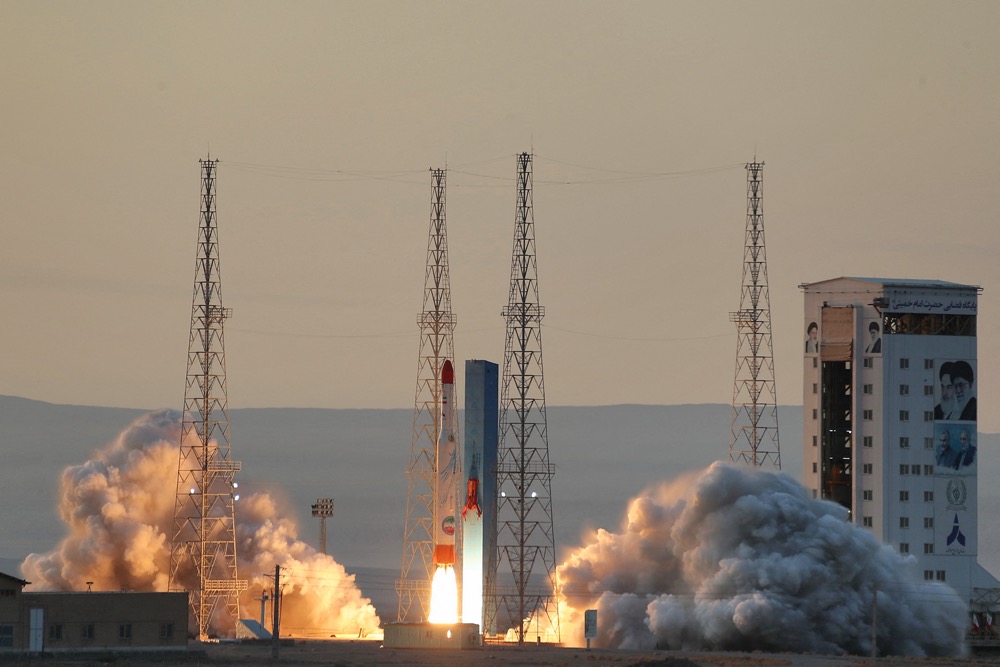
Among the advocates of a Biden nuclear deal that gives in to Iran’s demand for rescinding the IRGC’s terrorist designation is Ben Rhodes, who was deputy national security adviser to former President Barack Obama. Rhodes recently stated publicly that the terror designation is an overly burdensome roadblock to a deal that would benefit US national security interests. The facts, however, tell a different story.
According to data compiled by the Jewish Institute for National Security of America, Iranian aggression — specifically missile strikes, naval confrontations, cyberattacks, kidnappings and weapons tests — has doubled since Biden took office. There is no proof that the express wish of the Biden team to revive the nuclear deal and offer significant incentives on sanctions and nuclear inspections has moderated the behavior of the Iranian regime or curbed its proclivity for violence.
“There are alternative policy options available to the Biden administration: A combination of sanctions, aggressive sanctions enforcement, diplomatic isolation, covert action, deterrence, and a credible military option is one,” said Brodsky.
“There is now greater realignment with the E3 (group of France, Germany and Italy) on Iran policy, and Washington should use this dynamic to move on from the JCPOA.”
Critics of the Biden administration’s policy on Iran say that maintaining the foreign terrorist organization, or FTO, designation of the IRGC benefits US interests that go beyond the purview of a nuclear deal with Iran.
“There is significant bipartisan opposition to removing the foreign terrorist organization designation,” said Brodsky.
“It would cause a firestorm if the Biden administration, in a midterm-election year, delisted the IRGC as an FTO. And, in the end, I have questions as to how much political capital the Biden administration wants to expend on resuscitating this deal.”
READ ALSO: 15 Palestinian children killed by Israeli regime so far in 2022 – Report
Stricker believes the Iranian leadership is hedging its bets in the expectation that US negotiators will eventually blink, in no small part thanks to the fact that Iran has not faced any real penalties for evading sanctions or for its clandestine nuclear advances.
“The IAEA has not been able to complete its investigation into whether Iran’s program maintains military dimensions, which is why the deal’s proposition of loosening restrictions on the enrichment side over time makes no sense,” she said.
In her view, if the Biden administration wants to halt its tumbling poll ratings, it needs to set much firmer conditions for Iran to follow in exchange for sanctions relief and a revived nuclear deal.
“A policy reset requires scrapping any legalization of Iran’s enrichment program and requiring full transparency and IAEA access,” Stricker said. “Tehran should prove to the world that the nuclear program is fully peaceful before it gets relief from sanctions.”
By all accounts, the likelihood of Iran opting for the straight and narrow is slim to none. On Monday, Ali Bahadori Jahromi, an Iranian government spokesman, told state media that Iran intends to continue the negotiations for a nuclear deal until its “national interests are fully and comprehensively protected.”
The Biden administration therefore might have to quickly reevaluate the utility of offering Iran practically everything it is asking for on a silver platter and, instead, begin charting a new policy course that takes into account the hard reality of the regime’s unabated nuclear-weapons development.
News Source: ARAB NEWS

